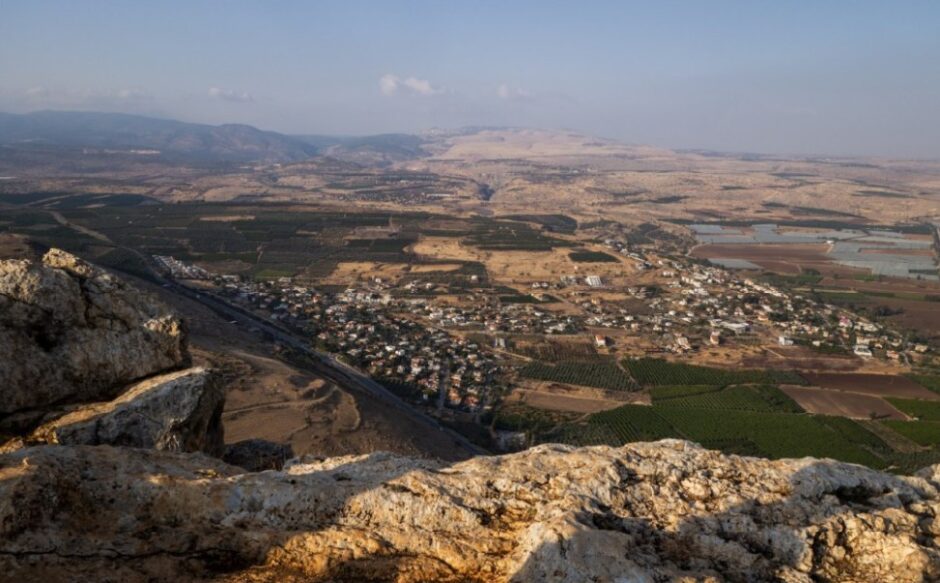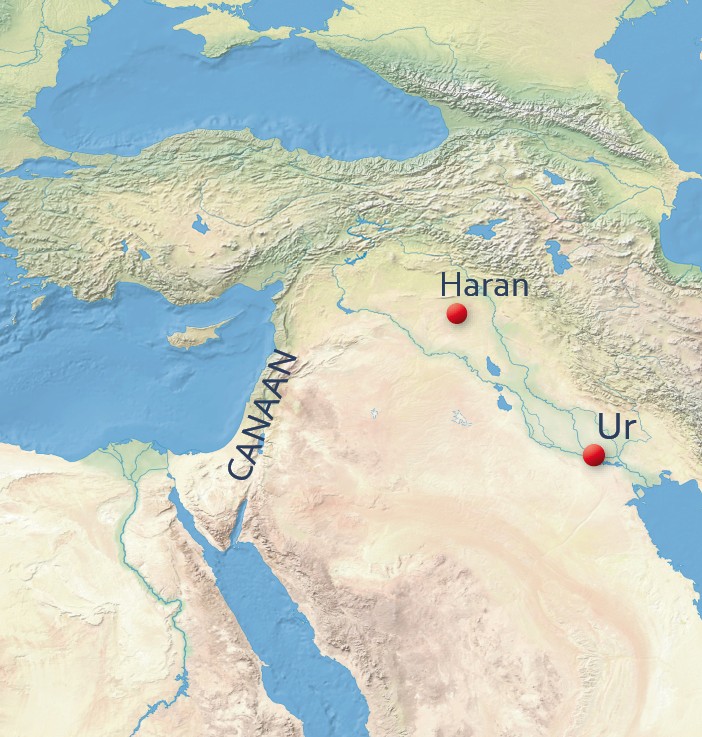Abraham and his wife Sarah (their original names were Abram and Sarai) were well over 70 years old. They were at an age when most people want to stay in familiar surroundings, com-forted and sustained by family and friends. Yet here they were, selling off their house and furniture, about to emigrate to some foreign land a thousand miles away. And it was not a case of boarding a jet and arriving at their new destination a few hours later. Abraham and Sarah proposed to travel by camel caravan, taking many months to get there. Even more bizarre, they had no idea at all where they were going to stay! ‘He went out not knowing where he was going’ (Hebrews 11:8).
Into the Unknown
We now know something of the wealth and the beauty of Ur of the Chaldees, the city they were leaving behind. Archaeologists have been staggered at its civilised amenities in the time of Abraham, with multi-storey houses fitted with lavatories, kitchens, and private chapels, well managed irrigation canals, and a thriving economy. It really would seem crazy for Abraham to be uprooting himself. Why did he do it?
The answer is, he was asked to go by the Lord his God. Abraham lived in a society where people worshipped idols. Chief of these at Ur was Nanna, the moon-god, whose ziggurat temple dominated the city. But there were thousands of lesser deities as well. Centuries had passed since the Flood, and the old, pure, one-God faith of Noah had been replaced by the popular fertility gods with their outward show of religion, and no moral demands on the worshipper.
Somehow Abraham still worshipped the one true God. He once declared in the audience of kings and nobles, ‘I have lifted my hand to the Lord, God Most High, Possessor of heaven and earth’ (Genesis 14:22). His belief in this God made him stand out among his fellows.
Stephen, the first Christian martyr, reminded his hearers about the call of Abraham. ‘The God of glory appeared to our father Abraham when he was in Mesopotamia,’ he said (Acts 7:2). Mesopotamia, the land between the rivers, included Ur, Abraham’s home town. Here, one day, the angel of God brought him the message: ‘Go from your country and your kindred and your father’s house to the land that I will show you.’ Abraham’s response was decisive. ’So Abram went, as the Lord had told him’ (Genesis 12:1–4).
How would you react if you were leading a settled life and one day an angel of God knocked on your door and told you to move? What about your job, the children’s schooling, your parents, your house and your friends? You might be inclined to wait a week, or a month, just to see if God really meant what He said. But that was one of the great facets of Abraham’s character. He never hesitated. He had the vital quality of faith—a trust in God so strong that he could shrug off the fear of the unknown that would have kept a lesser man wavering in indecision.
That faith would bring him rewards greater than he could ever have enjoyed in Mesopotamia. It would even earn him the title of ‘friend of God’ (James 2:23). The apostle in Romans says that through the righteousness of faith Abraham will inherit the world! (Romans 4:13). Think of that—the world, in exchange for a few more years of luxury in Ur of the Chaldees! Most people would say “A bird in the hand is worth two in the bush”. It takes courage to make the break.
As we delve into the Bible, we find that Abraham’s decision is repeated again and again in the lives of people of God. In fact, it is one we must all make if we want to share in the Kingdom of God. ‘Go from your country and your kindred and your father’s house’ was the actual wording of the command to Abraham (Genesis 12:1). Centuries later, Peter the fisherman left his business behind to be a disciple. ‘See, we have left our homes and followed you!’ he reminded Jesus. Jesus replied, ‘Truly, I say to you, there is no one who has left house or wife or brothers or parents or children, for the sake of the kingdom of God, who will not receive many times more in this time, and in the age to come eternal life’ (Luke 18:28–30).
It can be very hard to give up all we have worked for, and harder still to have our relatives refuse to follow us in the pilgrim way. But always there must be a point of departure, a committal of our future into the hands of God, like plunging off into the deep water where we cannot touch the bottom. That is what faith is all about—not just believing the facts about God, but testing His promises in our lives.
From Haran to Canaan
So, Abraham journeyed northwards up the Euphrates valley. Only Terah, his ageing father, and his nephew Lot, decided to go with him. They broke the journey at Haran for a while, where Terah died, and Abraham and Lot then pushed on southwest into the land of Canaan, which we know as Israel.
The country was not empty. ‘At that time the Canaanites were in the land’ (Genesis 12:6). The Canaanites worshipped idols, and practised sexual immorality and bestiality that were offensive to God the Creator. Abraham’s first recorded act on entering the land was to build an altar to God. It was a testimony to all around him that he was different. His God had promised to give him the Canaanites’ houses and fields. ‘To your offspring I will give this land,’ the angel had told him (Genesis 12:7). But he was prepared to wait, and meanwhile he was making his position clear.
He is an example to all followers of Christ, who find themselves in new surroundings among new people—perhaps when they move to university, or into a new job, or to a different part of the country. If they state clearly early on that they believe in God, and worship Him, they do not have later to be embarrassed by compromising conversations or extricate themselves from invitations to join in inappropriate pursuits. Indeed, others may see their testimony, and be drawn to enquire about their God. It was a pattern Abraham followed throughout his life. It was repeated frequently in the early months as he travelled up and down to inspect the land that God had promised to give him.
The Land of Promise
His old life in Ur of the Chaldees must have seemed remote and unreal as he tramped up and down with his flocks through the green valleys and the broad coastal plain. The land in which he had grown up was flat, drab and uninteresting compared with the mountains, streams and tiny villages that now confronted him in ever changing landscapes. The prospect of possessing this beautiful countryside for himself must have enthralled him.
How had he adjusted to a nomadic life, sleeping under the stars? Did the joy of the promised land compensate for the discomforts of a tent? Did he never hanker for the soft city life, with its comforts and amenities, its solid houses and social whirl? Camping is exciting for a few weeks in the holidays, but to live under canvas (or goats’ hair) for years on end is a different story. The writer to the Hebrews suggests it was some sacrifice:
By faith he went to live in the land of promise, as in a foreign land, living in tents with Isaac and Jacob, heirs with him of the same promise. For he was looking forward to the city that has foundations, whose designer and builder is God
(Hebrews 11:9–10).
The reward to which he looked forward, in the goodness of God, had a solidity and permanence that would outlast even the great man-made metropolis of Ur. Abraham believed in it, and was prepared to wait for it, in a tent.

David Pearce
(to be continued)



